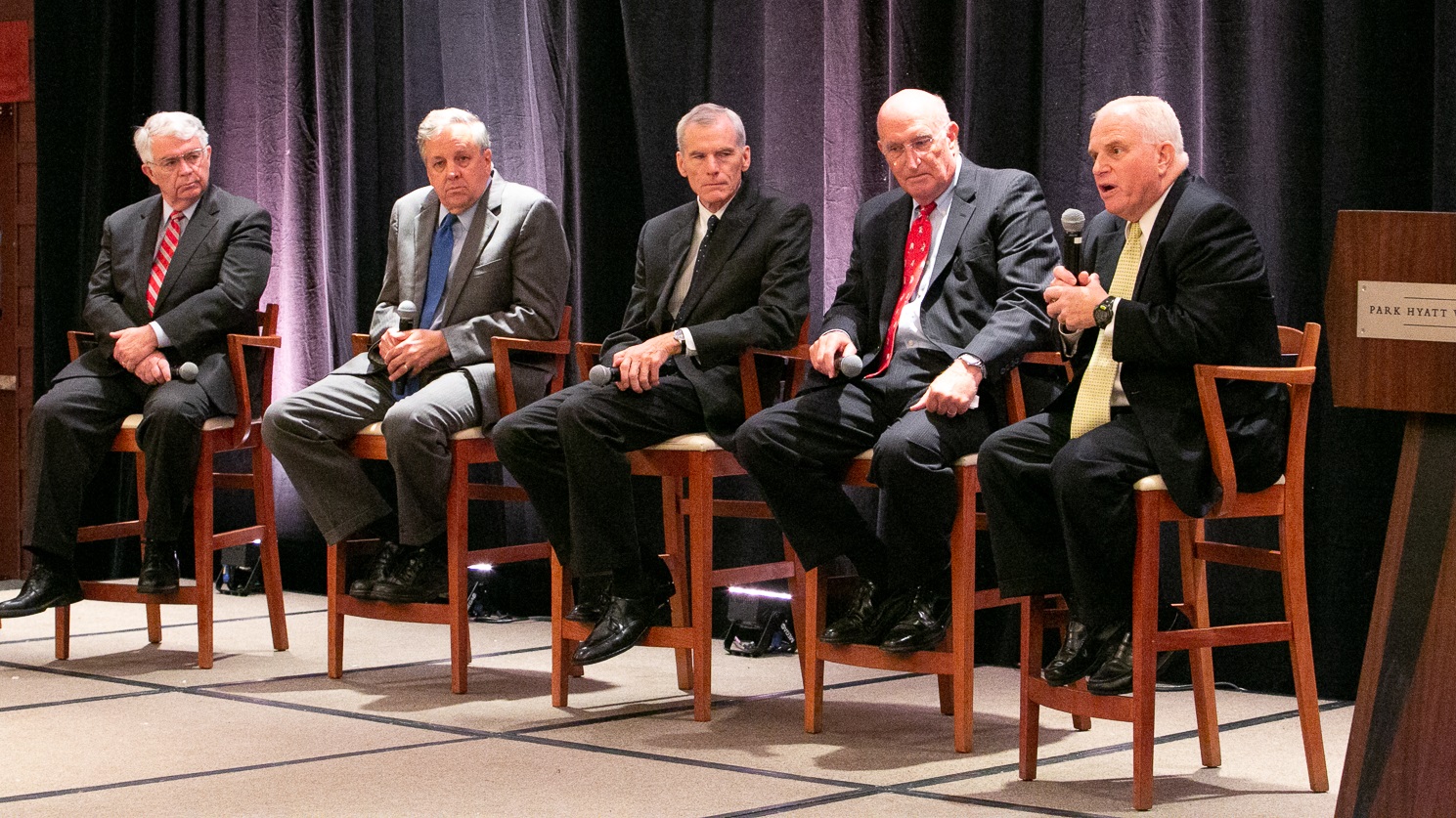The Foundation’s 2018 Graduate Fellowship Conference this fall was focused around the theme of “Answering the Call: Reflecting on Leadership and Service” and featured several impressive speakers with decades of experience in our nation’s top ranks. The day began with keynote remarks from former four-star General and Chairman of the Joint Chiefs of Staff, General Richard Myers, as well as a former Fortune 500 CEO and best-selling author, Doug Conant. Afternoon breakout sessions were chaired by an expert line-up of principled public servants who provided insights on practical advice and guidance for careers in intelligence, diplomacy, national security, law and academia. Preceding the breakout sessions, these speakers came together for a plenary panel discussion to share some essential lessons-learned from their own journeys over the years.
For this Service Series post, we are pleased to share a snapshot of the Conference’s “Reflections on Leadership” panel discussion by presenting a collection of some of the thoughtful responses from our distinguished panel of public servants.
To the question “From your experience, what is one fundamental quality that every leader should possess?” our panelists, briefly introduced below, highlighted the following:
Ambassador Ian Kelly, Ambassador (ret.) in Residence at Northwestern University, former U.S. Ambassador to the Republic of Georgia and career diplomat shared: "All leaders should be able to articulate a mission for their organization, ideally in a couple of easy-to-remember sentences. Everyone must pull in the same direction, but they will pull all the harder if they understand the purpose of their work, and how important it is."
Rich Haver, current independent consultant with an extensive career in the intelligence community shared: “There is no substitute for honesty in any human endeavor. It can be painful and unpleasant, but it is better than any of the alternatives. The Intelligence Profession performs a vital service to the Nation’s political, policy and military leaders. If the intelligence community has a deserved reputation for being honest then those being served can trust the intelligence and take effective action. If the community is not believed to be honest then it ends up serving no purpose at all. Honesty also demands that intelligence officials directly address what they do not know. This can be difficult, embarrassing and subject the community to harsh criticism. It is however an imperative element in being fully honest.”
Vice Admiral Robert Murrett, Professor of Practice at the Maxwell School of Citizenship and Public Affairs at Syracuse University and former Director of the National Geospatial-Intelligence Agency shared: “Character is the most important quality for a leader. It serves as an essential foundation for other key leadership attributes that are required, including strategic vision, accountability and personal example, and maintaining a code of conduct throughout challenging missions. Character is also an essential ingredient allowing leaders to make the tough decisions that are inevitable in any organization. Finally, if the people understand that they are supporting a leader of character, there are very few limits on their collective effort, as they press forward and realize that they are making a difference.”
Dr. John Taylor, the Mary and Robert Raymond Professor of Economics at Stanford University and George P. Shultz Senior Fellow in Economics at the Hoover Institution with numerous previous advisory and council positions at the highest levels shared: “It is the courage of leaders to take ideas and apply them in practice. I will explain with an example: When George Shultz had just been sworn in as Secretary of Labor, a Longshoremen’s strike threatened; many said the federal government should intervene to prevent the strike and the resulting harm to the economy due to port closings. Shultz’s idea, based on years of experience in labor relations, was that private parties should sort this out; otherwise they will always be looking for a government solution. He argued that any short-run cost avoided by the intervention would be offset by larger long-run cost. So he courageously took his idea and applied it in practice: He let the strike proceed. In the end, management and labor worked it out, the harm to the economy was minor, and the long-run benefits were huge. In my experience in public policy this type of decision confronts leaders every day. Courage is essential to reach and implement the correct decision.”
Dan Dell’Orto, Senior Advisor and Counsel of AM General and former Principal Deputy General Counsel of the Department of Defense shared: “Integrity is not a particularly well-defined term, perhaps because it encompasses multiple traits that are found in successful leaders. At its core, integrity means honesty in everything one does. Around that core, the traits of moral and ethical behavior in one’s personal and professional life, never expecting more of a subordinate than one is willing to do himself or herself, delegating authority but retaining responsibility (i.e. providing a subordinate all the authority he or she needs to perform a task, while accepting responsibility if that subordinate fails without placing blame on the subordinate), always giving credit to subordinates for successful outcomes, loyalty to both superiors and subordinates, and genuinely caring about the welfare of subordinates. In sum, integrity is a broadly inclusive leadership trait. I chose the trait of integrity because it immediately comes to my mind when I think of the great leaders I have known. I have seen it in the most dynamic and aggressive leaders, but also in the most reserved and understated leaders. If you strip away any of the above components, you compromise severely the measure of a leader’s effectiveness.”
Read the full bios of the Conference speakers here: 2018 Graduate Conference Speakers and review a recap on the conference here. View photos of the conference on our Flickr page.


